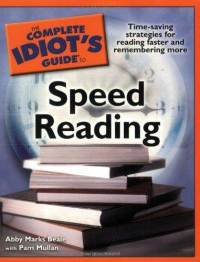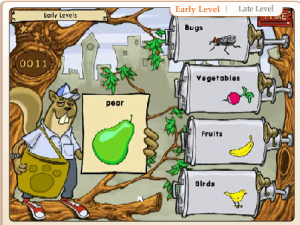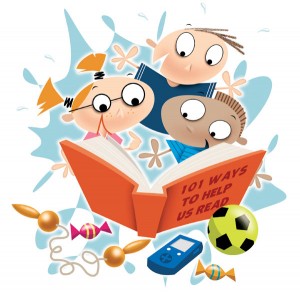Use Your Finger to Crank Your Brain
 I read faster from paper than I do on a computer screen. With paper I can use my finger to guide my eyes. A well-known speed reading technique, guiding and pacing, lowers the load on your visual system and helps avoid skipping back and other distractions. It is simple and it works. Try it out.
I read faster from paper than I do on a computer screen. With paper I can use my finger to guide my eyes. A well-known speed reading technique, guiding and pacing, lowers the load on your visual system and helps avoid skipping back and other distractions. It is simple and it works. Try it out.
With practice you can drop your finger and still get the effect because your eyes have been retrained. I get some of this effect but am still fastest with good comprehension when I use my finger.
This is just one of the techniques covered in the excellent book, The Complete Idiot’s Guide to Speed Reading.
If you don’t already use these techniques, several weeks of practice will produce a big jump in you reading speed and will likely improve comprehension as well.
Reading speed is important. The difference between a slow reader and an excellent reader means 3 books per week if you read an hour a day.
Very interested to hear from readers that have simple techniques (e.g. use of your finger) to crank your reading speed or other cognitive performances.
Categories: Books, Memory and Learning, Mental Focus, Perception, Training Tags: processing speed, speed reading
Student Reading Skill Doubles in 24 Days
 Scientific learning just published the results of a controlled study on Fast ForWord Reading Level 1. This is brain training software designed to boost the abilities of early readers such as students in first and second grade. It build skills with phonemes (sounds) and images, vocabulary knowledge and decoding and sequencing skills and even motivation for reading.
Scientific learning just published the results of a controlled study on Fast ForWord Reading Level 1. This is brain training software designed to boost the abilities of early readers such as students in first and second grade. It build skills with phonemes (sounds) and images, vocabulary knowledge and decoding and sequencing skills and even motivation for reading.
In the study over 200 first and second graders trained 48 minutes per day for 24 school days. When tested against a control group they scored nearly twice as well.
An impressive result especially since it is focused on the fundamental skill of phonological awareness. This involves recognizing, taking apart, adding and moving sounds. It supports high performance in both reading and writing.
Interested to hear from others that use specific techniques to build reading skills in children.
Categories: Child, Perception, Software, Training Tags: speed reading
Jump Two Reading Grade Levels in 8 Weeks
 I receive emails from parents asking about brain training for their children. Improving kid’s brain function and cognitive performance, especially in school is a very active area. It is covered regularly on the Next Brain Blog. You can check out what has already been posted by going to the categories pull down menu (to the right) and selecting Child or Student under the Life Stage or Vocation category.
I receive emails from parents asking about brain training for their children. Improving kid’s brain function and cognitive performance, especially in school is a very active area. It is covered regularly on the Next Brain Blog. You can check out what has already been posted by going to the categories pull down menu (to the right) and selecting Child or Student under the Life Stage or Vocation category.
One of the most exciting and scientifically robust options parents have for boosting the brain power of their children are the products provided by Scientific Learning (I have no affiliation). They apply brain fitness techniques to improve reading and language comprehension skills in K-12. They have good evidence to claim that they can:
Improve the reading level of students by two grades even if the student is already performing at an advanced level.
Parents can rent the program here for about $200.
Interested to hear from readers that have experience with brain fitness products from Scientific Learning.
Categories: Child, Memory and Learning, Software Tags: speed reading
Mindless Reading Lowers Cognitive Performance – How Do We Stop?
 There are two kinds of mindless reading. The first kind, often associated with guilty pleasure, involves reading something just for fun. There is no expectation that you will learn or grow. A trashy novel is a good example. The second kind of mindless reading involves moving your eyes across and down a page while you are thinking about something else or otherwise not paying attention. You are not being mindful of the written word. Re-reading the same paragraph over and over or getting to the bottom of a page and not remembering a single word are typical examples.
There are two kinds of mindless reading. The first kind, often associated with guilty pleasure, involves reading something just for fun. There is no expectation that you will learn or grow. A trashy novel is a good example. The second kind of mindless reading involves moving your eyes across and down a page while you are thinking about something else or otherwise not paying attention. You are not being mindful of the written word. Re-reading the same paragraph over and over or getting to the bottom of a page and not remembering a single word are typical examples.
According to researchers we often zone out, even when we are trying to read for understanding or receive prompts to pay attention. This suggests:
For those interested in improving cognitive performance, mindless reading presents a major opportunity.
But how can we keep from reading mindlessly when we don’t want to? I’ve spent sometime researching that question and have come up empty. Despite its prevalence there has been very little scientific research done on mindless reading. What has been done shows that it lowers the cognitive performance of reading and lowers test scores.
 In studies subjects that experience mindless reading have reported being distracted by hunger, thirst, sleepiness, boredom and sexual desire. Making sure you are rested, well fed and the rest to avoid mindless reading makes good common sense. But what else can be done?
In studies subjects that experience mindless reading have reported being distracted by hunger, thirst, sleepiness, boredom and sexual desire. Making sure you are rested, well fed and the rest to avoid mindless reading makes good common sense. But what else can be done?
Very interested to hear from readers about specific techniques for decreasing the frequency of unwanted mindless reading.
Categories: Memory and Learning, Mental Focus Tags: speed reading
How Fast Can You Read and Does it Matter?
Reading is a primary means of absorbing new information and knowledge. Improving your ability to read – faster, better comprehension and in novel ways – enhances learning capacity and creativity and so it will be a frequent topic on the Next Brain Blog.
 Increasing your reading speed without losing comprehension means saving time or read more in the same amount of time. If you normally read for an hour a day increasing your reading speed from 250 words per minute (international average) to 6oo means you can read approximately 150,000 words more per week. This is the equivalent of a meaty non-fiction book every week or 52 every year.
Increasing your reading speed without losing comprehension means saving time or read more in the same amount of time. If you normally read for an hour a day increasing your reading speed from 250 words per minute (international average) to 6oo means you can read approximately 150,000 words more per week. This is the equivalent of a meaty non-fiction book every week or 52 every year.
How fast do you read? Take this quick free test from RocketReader and find out.
There are proven techniques for increasing reading speed. For example, guiding, skimming and grouping are all proven to work. Other less proven techniques include minimizing subvocalization (talking aloud to yourself while reading) and widening your visual span (number/lengths of words you can taken in at a glance). You can learn to speed read from programs, books, workshops or software. We will discuss all these techniques and options on the Next Brain Blog. Let’s start with software as it affords easy experimentation as well as a good way to be systematic.
There are many software packages on the market that promise to improve your reading skills. Check out TopTenReviews of Speed Reading Software to get a quick overview of what is available. Prices range from $12 to $80 and the more fully features packages are likely worth the extra cost.
I plan on taking the Reader’s Edge (top-rated speed reading software) 30-day challenge and will blog on the results. In the meantime, if you have used speed reading software please post a comment and share your experiences and results.
Categories: Memory and Learning, Software, Training Tags: speed reading
